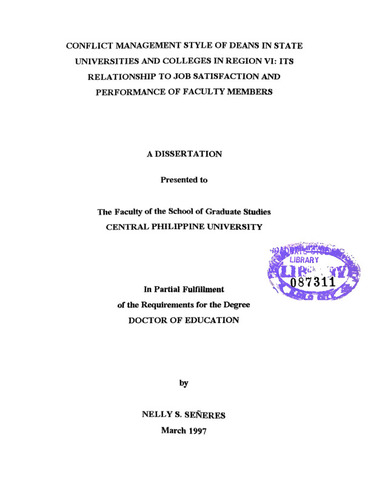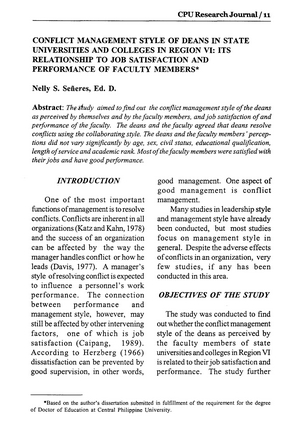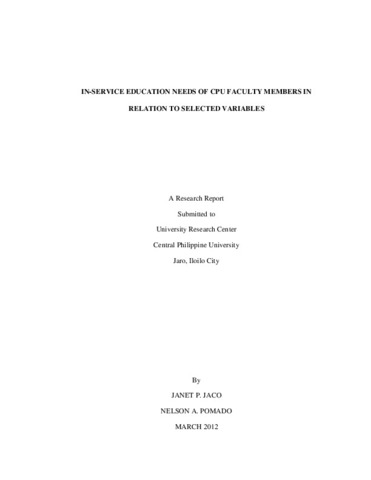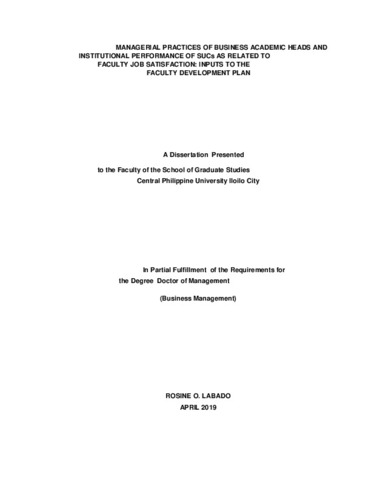Ipakita ang simpleng tala ng item
Conflict management style of deans in State universities and colleges in Region VI: Its relationship to job satisfaction and performance of faculty members
| dc.contributor.adviser | Caipang, Marjorie A. | |
| dc.contributor.author | Señeres, Nelly S. | |
| dc.coverage.spatial | Western Visayas | en_US |
| dc.date.accessioned | 2021-07-30T02:07:53Z | |
| dc.date.available | 2021-07-30T02:07:53Z | |
| dc.date.issued | 1997 | |
| dc.identifier.citation | Señeres, N. S. (1997). Conflict management style of deans in State universities and colleges in Region VI: Its relationship to job satisfaction and performance of faculty members (Unpublished Doctoral dissertation). Central Philippine University, Jaro, Iloilo City. | en_US |
| dc.identifier.uri | https://hdl.handle.net/20.500.12852/1261 | |
| dc.description | Abstract only | en_US |
| dc.description.abstract | The study was conducted to find out whether the conflict management style of the deans as perceived by the faculty members of state universities and colleges in Region VI is related to faculty job satisfaction and performance. The study further aimed to determine whether conflict management style of deans as perceived by themselves and by the faculty members under them significantly differ when the respondents are grouped according to age, sex, civil status, educational qualification, length of service and academic rank. The study also sought to determine the job satisfaction of the faculty members in every state university/college and whether they differ in their level of job satisfaction when they are grouped according to age, sex, civil status, educational qualification, length of service and academic rank. The study further aimed to determine the job satisfaction of the faculty members in every state university/college and whether they differ in their level ofjob satisfaction when they are grouped according to age, sex, civil status, educational qualification, length of service, and academic rank. It likewise sought to find out whether the level of job satisfaction of faculty members is related to their performance ratings. The descriptive and correlational study utilized three questionnaires, namely, conflict management style of deans as perceived by themselves; conflict management style of deans as perceived by the faculty members, and the Job satisfaction of faculty members. The study sample consisted of 15 deans and 235 faculty members randomly selected proportionately from the seven state universities and colleges (SUC's) in Western Visayas. These participating SUC;s were ASCA in Aklan, PSPC in Capis, PSCA in Antique, CAHMSC in Negros Occidental, NIPSC in Estancia, ISCOF in Barotac Nuevo, and WVSU in Iloilo City. Data were collected using the three structured questionnaires. The data were computer processed and analyzed. The main statistical tools used in data analysis were the frequency distribution, the mean, the weighted mean, t-test, analysis of variance, Pearson Product Moment Coefficient of Correlation, Cramer's V, and Wilcoxon's signed rank test or the coefficient of differentiation. Major Findings of the Study The deans in the seven SUC's were mostly 46 years old and above, female, married, doctoral degree holders, 1-4 years in service as deans, and having an academic rank of professors. On the other hand, most of the faculty members were 45 years old and below, females, married, Master's degree holders with 21 units or more in Ed.D./Ph.D., 9 years and above in service, and having an academic rank of assistant professors. Both the deans and the faculty members similarly perceived that the conflict management style commonly employed by the deans was "collaborating". The faculty members did not differ in their perceptions of the conflict management style of their deans when the former were grouped according to age, educational qualification, length of service, and academic rank. The single/widowed faculty members perceived their deans as having the "compromising" style for their second preference in handling conflicts. The female faculty members perceived their deans as having "avoiding" style for their last preference. Not one of the personal variables studied was significantly related to the conflict management style of deans as reported by themselves. There was no significant relationship between the conflict management style of the deans and the level of Job satisfaction and performance of the faculty members. Most of the faculty members in every state university/college were either satisfied or very satisfied in their jobs. The personal variables such as age, sex, civil status, educational qualifications, length of service, and academic rank of the faculty members were not significantly related to their level of job satisfaction. There was a slight but significant relationship between the level of job satisfaction and performance ratings of the faculty members. Majority of the faculty members in every state university/college obtained a performance rating of "very satisfactory". The level of job performance of the faculty members is slightly related to their level of job satisfaction. Conclusions The deans and faculty members did not differ in their perception of the conflict management style used by the deans. The deans unanimous preference for the "collaborating" style, as perceived by themselves and by the faculty members under them means that they tend to seek solutions to the problems to the satisfaction of conflicting parties through an open discussion until they find creative solution to interpersonal problems. Faculty members with high level of job satisfaction tend to have better job performance as measured by their performance ratings. This result does not support the null hypothesis that there is no significant relationship between the level of job satisfaction of faculty members and their performance ratings. This study supports Janay's findings that conflict management style and educational qualification are not related. However, conflict management style significantly varied according to the faculty members' civil status. Single/widowed faculty members scored significantly higher in "compromising" style in handling conflicts than did the married faculty members. Moreover, the female faculty members scored significantly higher than did the male faculty members in perceiving their deans as using "avoiding" style. These last two findings do not bear out the null hypothesis that teachers' perceptions do not vary according to their civil status and sex. The findings of the study support the null hypothesis that "there is no significant difference in the job satisfaction of the faculty members when they are grouped as to age, sex, civil status, educational qualification, length of service and academic rank. As to educational qualification, this study supports Caipang's finding that there was no significant difference in the Job satisfaction level of the college graduates and of the non-college graduates. However, this study does not bear out Varley's conclusion that the highly educated men were least satisfied in their Jobs nor the findings of Shapiro and Stun that professional workers were more satisfied than the non-professional workers. As to length of service, this study confirms the findings of Caipang which led to the conclusion that all the three groups had similar levels of Job satisfaction and that Job satisfaction is constant for those who have been in the service for a long time. On the other hand, this study does not corroborate (a) Varley's finding that teachers' satisfaction increases with number of years of teaching; (b) Buensuceso's conclusion that length of service had significant influence on Job satisfaction; and (c) Ounce's findings that teachers with longer years of teaching have a higher level of Job satisfaction than those with shorter teaching experience. As to salary/academic rank, this study does not support Harman's findings that dissatisfaction is high in Jobs which are paid poorly or low in status nor Glimer's findings that dissatisfaction was closely related to income; those with higher income expressed greater Job satisfaction. This implies that the deans and the faculty members did not differ in their perception of the conflict management style used by the deans. It further shows that job satisfaction and job performance of faculty members do not influence the faculty members' perception of the conflict management style of their deans. Recommendations On the bases of the findings and conclusions drawn from this study, the following recommendations are offered: 1. All the deans were found to be employing the "collaborating" style in managing conflict. It was revealed that the faculty members under them were "satisfied" with their job and "very satisfactory" in their performance. These two facts give enough bases for recommending that other school administrators be encouraged to use the "collaborating" style in resolving conflicts. 2. Since job satisfaction has been found to be significantly related to job performance and majority of the faculty members were only "satisfied" in their level of job satisfaction, it is recommended that state universities and colleges should adopt policies to improve the level of job satisfaction among their faculty members so that they will perform better. 3. A seminar-workshop on conflict management styles be conducted for school administrators and prospective administrators so that they could gain the skill and competence in making sound decisions in resolving conflicts. Furthermore, their sensitivity to the causes of conflict should also be developed. 4. The ultimate aim of this study is to promote effective and efficient management of state universities and colleges in Region VI. It is, therefore, recommended that attention of the SUC's presidents be called to the findings in regard to the faculty members level of job satisfaction so that they could adopt strategies to increase level of satisfaction. 5. Conflict management style was not related to job satisfaction or job performance in this study, but as revealed by Caipang's study, employees who are satisfied with their job tend to perform better. This was also supported by this study that job satisfaction is significantly related to job performance. Hence, there is a need for further research that make use of a more refined and sharper instruments or more discriminating procedures for measuring/determining conflict management style of administrators, as well as job satisfaction and job performance of faculty members. This research should include the perception of non-teaching personnel, students, and alumni of the conflict management style of deans/administraators. 6. Further studies in conflict management style should be conducted among administrators of Higher Education Institutions other than SUC's in Region VI, so that the results could be compared with those of this present study. These studies should consider other variables such as environmental variables, organizational climate, work load, etc., in relation to conflict management style. 7. The study be made in other Regions of the country to see a picture of the conflict management style of school administrators across regions. | en_US |
| dc.format.extent | xxv, 188 leaves | en_US |
| dc.language.iso | en | en_US |
| dc.subject.ddc | GSL Theses 378.242 Se566c | en_US |
| dc.subject.lcsh | Deans (Education) | en_US |
| dc.subject.lcsh | Conflict management | en_US |
| dc.subject.lcsh | State universities and colleges | en_US |
| dc.subject.lcsh | Job satisfaction | en_US |
| dc.subject.lcsh | Performance | en_US |
| dc.subject.lcsh | College teachers--Job satisfaction | en_US |
| dc.subject.lcsh | State universities and colleges--Faculty | en_US |
| dc.subject.lcsh | State universities and colleges--Faculty--Job satisfaction | en_US |
| dc.subject.lcsh | Teachers--Job satisfaction | en_US |
| dc.subject.lcsh | Teachers | en_US |
| dc.subject.lcsh | College teachers | en_US |
| dc.subject.lcsh | Philippines--Western Visayas | en_US |
| dc.title | Conflict management style of deans in State universities and colleges in Region VI: Its relationship to job satisfaction and performance of faculty members | en_US |
| dc.type | Dissertation | en_US |
| dc.description.bibliographicalreferences | Includes bibliographical references | en_US |
| dc.contributor.chair | Traviña, Miriam M. | |
| dc.contributor.committeemember | Herradura, Elma S. | |
| dc.contributor.committeemember | David, Fely P. | |
| dc.contributor.committeemember | Catalogo, Lucy B. | |
| dc.contributor.department | School of Graduate Studies | en_US |
| dc.description.degree | Doctor of Education with specialization in Administration and Supervision | en_US |
| local.relation.associatedcontent | https://repository.cpu.edu.ph/handle/20.500.12852/2026 Full paper published in CPU Research Journal | en |





